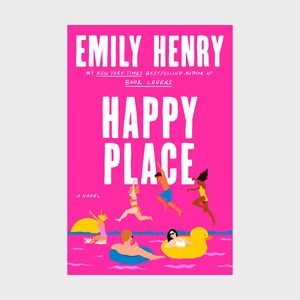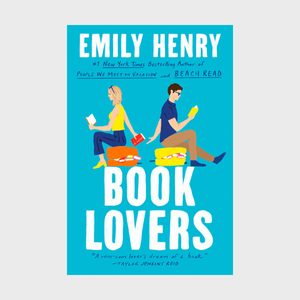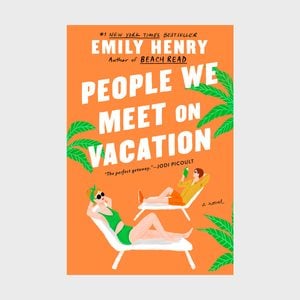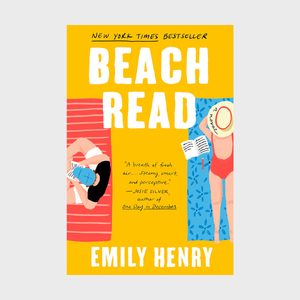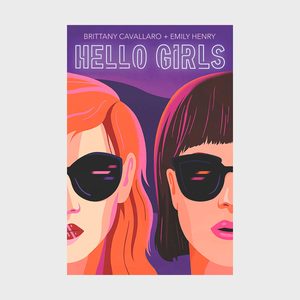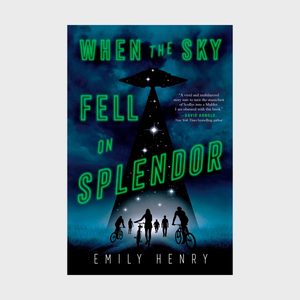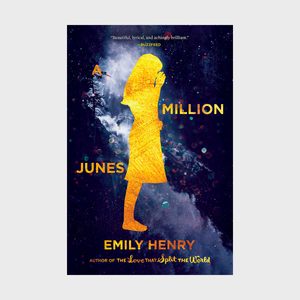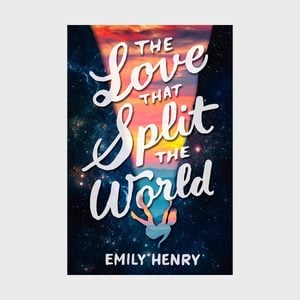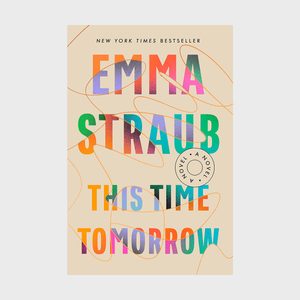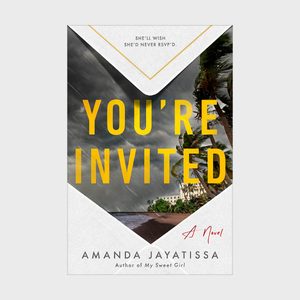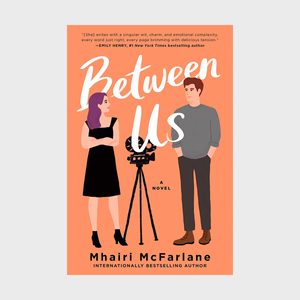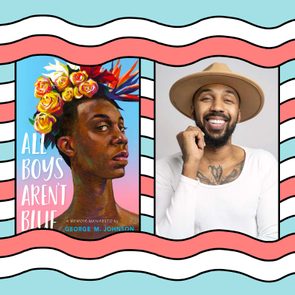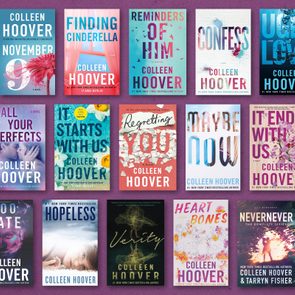Author Emily Henry on Why Reading Romance Is an “Act of Hope”
Updated: Apr. 09, 2024

For author Emily Henry, romance novels are a balm for a world on the brink
If you’ve stepped foot in a bookstore in the past three years, odds are you’ve come across Emily Henry novels. You know the front table stacked with beach reads at the first whisper of warm air each year? Or that shelf in the romance section studded with candy-colored illustrated covers? That’s where you’ll find all three of the author’s bestselling books.
There’s a better-than-average chance that her latest release, which hit shelves on April 25, 2023, will follow suit. (As Library Journal reports, it topped library hold lists the week it came out.) Happy Place by Emily Henry promises to whisk readers away for another feel-good story of heartbreak and hope. Set in Maine during a reunion between friends, it’s like your favorite summer books, escapist travel books and second-chance romances rolled into one.
So how did this onetime author of young adult fiction become one of adult readers’ favorite authors? And does Henry think she’s found her permanent “happy place” on the romance shelf? To find out, we asked the queen of the rom-com directly. Here’s what Henry has to say about her career journey, the vulnerability of love stories, her picks for the best books to read this summer and what she might tackle next.
Join the free Reader’s Digest Book Club for great reads, monthly discussions, author Q&As and a community of book lovers.
The making of an “overnight” success
Once a writer hits a certain level of success, it can be tough to remember she wasn’t always a #BookTok sensation. Somehow, years of hard work get painted over with words like “overnight success.” So let’s get one thing straight: Bestsellerdom wasn’t instantaneous for Emily Henry.
She’s been a literary darling for the past three years. Readers, critics and librarians alike have watched her star grow. And it’s practically impossible to walk into a bookstore and not find one of her rom-coms on display. But not so long ago, Henry was, in her own words, “a mid-list author.”
She eked out a respectable living writing coming-of-age YA books. And while those novels may not have garnered the dedicated fan base of her adult romances, they’re still smart, poignant stories worth reading. (A Million Junes, in particular, is a wonderfully lyrical and evocative father-daughter novel that will, without fail, make you cry.)
It’s clear from those stories that YA fiction wasn’t just a way station on Henry’s journey to adult fiction; it was something she truly enjoyed writing. “The thing that drew me to YA was ultimately the same thing that pulled me into writing what I write now,” she explains. “I love books that are about an emotional or mental transformation, and that happens on an intense level when you’re a teenager, but it also happens again and again as you move through life.”
Middling success was the perfect way to kick-start a writing career, she says. Watching other writers hit milestones ahead of her taught her to temper expectations and to be aware that reaching the next rung on the charts isn’t a cure-all for fears or frustration.
“I realized that no matter how good things look from the outside, this job will still have its challenges,” she says. “I’m so much more appreciative of this strange, surreal moment I’m having because I had this other career before.”
The pursuit of happiness
Perhaps some writers plot their careers like their books. Maybe they do market research or choose a book genre based on sales trends. Maybe they write with the end—a book club pick, a comfortable living, a fat wallet—in mind.
That’s not the Emily Henry way.
Her shift away from YA was un-plotted and driven only by an itch to do something “fun and different” in her spare time. And what sounded fun was a romantic comedy set on Lake Michigan, in a place like her college town of Holland, Michigan. She typed away at the story as a personal side project, a file saved as “Beach Read” that she wasn’t sure would ever see the light of day.
“It wasn’t a career decision at all,” she says. “Every once in [a while], I would wonder if it was publishable. It wasn’t until I saw this huge [boom] in romance, with authors like Jasmine Guillory and Helen Hoang, that I pulled it back out and sent it to my agent to see if she thought it was something people might actually want to read.”
The rising tide of romance
Henry’s timing was perfect. There’s no way she could have known that her first foray into romance would catch readers at home during an unprecedented season of fear and isolation. She wrote Beach Read in a pre-pandemic world, but it hit shelves—or, more likely, at-home devices—in May 2020.
Post-pandemic book sales suggest readers still want HEAs (that’s happily-ever-afters in romance book speak) more than ever. According to Publishers Weekly, romance sales keep climbing, jumping almost 45% in the first quarter of this year. Book sales in general are still higher than pre-pandemic numbers, and Publishers Weekly calls romance novels a “key driver.”
Henry has a theory about the raging hunger for love stories: These books empower readers to keep their hearts soft and brave—and hopeful—when the world feels like it’s falling apart.
“The world is on fire,” she says. “The thing that’s still within our power is how we love the people around us, how we tend to their hearts and our own. I sometimes see readers sort of hand-wave off their love of romance as ‘just wanting an escape,’ but I honestly think that minimizes what we’re actually doing when we make and experience this kind of art. It’s an act of hope.”
Henry is the first to acknowledge that reading a book with a happy ending doesn’t change the fact that life is full of grief and heartache. But she believes happily-ever-afters do remind readers what we’re all fighting for.
“All that it does [is] put a stake in the ground and say, ‘This is what truly matters. This moment weighs more than all the pain before it, and it earns the pain that comes after it,'” she says.
In the end, she’s just one romance author who got swept up in the mid-lockdown clamor for something happy, something good. She might have intended Beach Read as a fun personal project, but it turns out the story gave readers a dose of dopamine and earnest, vulnerable optimism in a remarkably tough time.
Find your favorite Emily Henry books
(Psst! Already read these? Find more happy endings by reading the Elin Hilderbrand books in order and books like The Summer I Turned Pretty.)
Falling in love with romance
Despite her clear passion for romance, Henry admits that she’s new to the genre.
“I was a romance writer before I was a romance reader,” she reveals. “I know there’s been a ton of debate and disagreement over the cutesy illustrated cover trend, but I do think that sort of cover brought in a ton of new romance readers, and I was one of those.”
In the author’s view, it takes guts to admit that you read or write about love. Considering the stigma attached to reading romances instead of, say, highbrow literary fiction books, the genre may have previously sacrificed readers on the alter of spicy photography. As appealing as rippling abs and ripped bodices may be, they’re a visual announcement that someone in the book is probably getting it on. Those “cutesy” covers helped wannabe romance readers wade in more easily.
“You feel like you can read on the train or in the doctor’s office without fear of judgment,” she says. “Then once you discover how much you love romance novels, the fear of judgment dissipates anyway, and you accept how stupid it is [to] waste any time or energy being embarrassed to love genuinely wonderful books.”
It’s clear that talking about romance touches a nerve with Henry. She wonders why society is “so squeamish” about happy endings. She questions why tragic love stories get called art while happy endings get called cheesy. We shouldn’t feel self-conscious about wanting a happily-ever-after, she reasons. Why shouldn’t we want the same thing in art as we do in life?
“There is no safe way to fall in love,” she says. “You’re always risking pain, embarrassment, regret. I tend to think the best things in life require this of us.”
The happy place
It would be easy to give Henry’s career the Hallmark treatment, wrapping it up with a cute bow and declaring that she’s found her happy place in the romance section. But that might be oversimplifying things a bit.
“I don’t truly feel like I know quite where my books fit, genre-wise,” she says. “The love story is always an important component, and it’s never the only important component.”
It’s true: Henry’s books tell love stories, but they don’t stop there. In Happy Place, the friendships simmer with as much tension as the romance. In Beach Read, characters learn how to grow through grief. People We Meet on Vacation dives deep into dreams and personal identity, while Book Lovers makes sisterhood matter as much as falling in love.
In other words, these may be some of readers’ favorite romance novels, but they also veer into the women’s fiction realm and tackle heavier themes than perhaps the bubble-gum romances non-readers may be imagining.
So, what’s next for one of America’s favorite feel-good authors?
“I love what I’m doing right now, and it has been my happy place for the last four years, but this definitely won’t be the last genre I publish in,” she says. “I read every genre. I write every genre, except nonfiction.”
Of course, that doesn’t mean she’s giving up on romance. Aside from the fact that she has three rom-com film adaptations in the works—Book Lovers, Beach Read and People We Meet on Vacation are all getting the Hollywood treatment—she enjoys the genre too much to give it up.
“There will be other twists and turns [in my career] for sure, but I could see myself coming back to romantic comedies,” she says. “There’s just something so special about them.”
Emily Henry’s top three summer reads
The sweltering months of summer may give us ample opportunity to get out and get active. But they also conjure memories of childhood summertime reading, and as certifiable bookworms, we think that’s an even smarter use of those lazy weekend afternoons. But what to read?
Henry may be a writer, but she is first and foremost a reader. And the three books below (one of which comes out later in the summer) have made her reading list this year.
Looking for your next great book? Read four of today’s bestselling novels in the time it takes to read one with Reader’s Digest Select Editions. And be sure to follow the Select Editions page on Facebook!
Source:
- Library Journal: “‘Happy Place’ by Emily Henry Tops Holds Lists”
- Publishers Weekly: “Print Books Held Steady in the First Quarter”



















